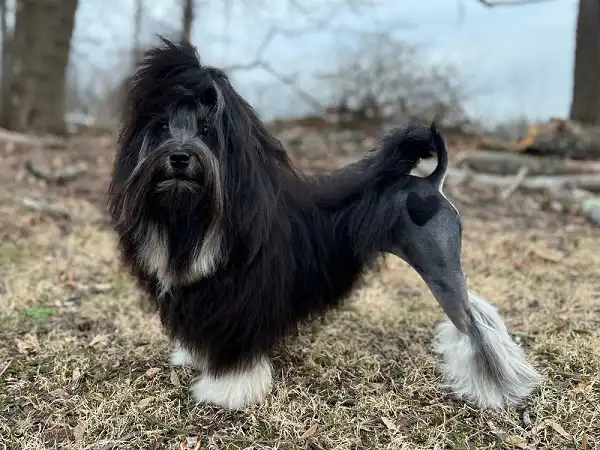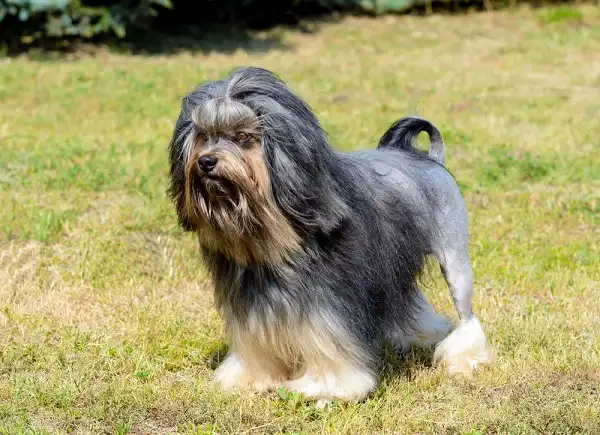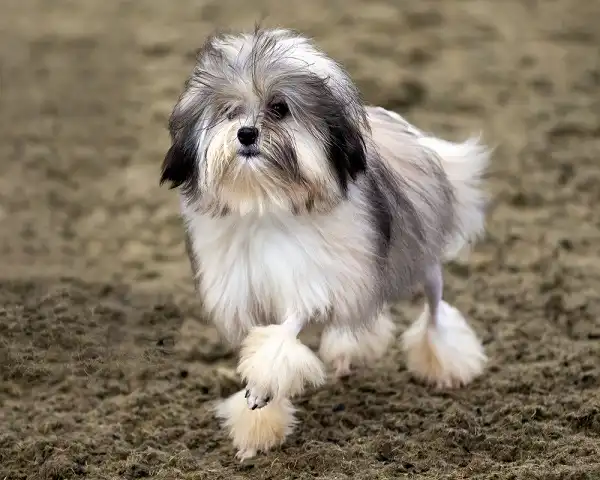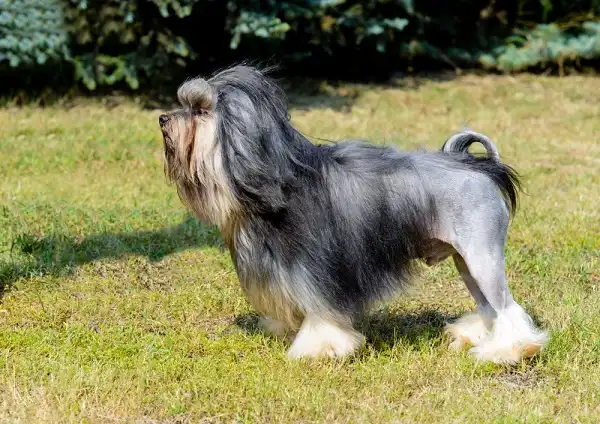Have you ever heard of a Lowchen? Often described as “a little lion” due to its wavy, fluffy fur and tiny size, the Lowchen is often overlooked when compared to larger breeds like Golden Retrievers or German Shepherds. But don’t be fooled by this small pup’s stature — the Lowchen is an intelligent canine with a loving nature and cheerful disposition that will leave your heart melting! In this post, I’ll share some fun facts about the Lowchen breed and how to care for them so you can decide if it might be right for you. Read on for more info about these furry friends!

Lowchen Description
The Lowchen is a small dog breed. They have a compact but well-balanced body, with a broad chest and slightly arched neck. Their eyes are dark, round, and set apart, expressing a lively and intelligent demeanor. The ears are medium in size, set at eye level, and hanging close to the head. The tail is carried over the back, adorned with long, feathered hair. The breed’s hallmark is its unique “lion” coat. The long, flowing hair on the neck, chest, and half of the back, and the plume at the end of the tail are left full, resembling a lion’s mane and tail. The rest of the body is clipped close, giving it the appearance of a miniature lion. This distinctive hairstyle requires regular grooming to maintain its appearance. Lowchen’s come in various colors, including black, white, silver, and cream.
Lowchen Habitat
Lowchens adapt well to a variety of living situations. Thanks to their small size, they can comfortably reside in apartments or houses with small yards. Despite their energetic temperament, Lowchens do not require excessive space to roam, making them suitable for urban living. Still, they appreciate having a safe, enclosed outdoor area where they can play and explore, and regular walks are a must to keep these lively dogs entertained and healthy. Regardless of dwelling size, it’s important to provide an environment conducive to mental stimulation for a Lowchen. These intelligent dogs enjoy problem-solving activities and toys that challenge their minds. Regular interaction and playtime with their human companions are crucial for their well-being, as they thrive on social engagement. They might develop behavioral issues, such as excessive barking or chewing, if left alone for extended periods.
Lowchen Diet
Lowchens, like most dogs, require a balanced diet to thrive. High-quality dog food, whether commercially manufactured or home-prepared, should provide adequate nutrition. However, it’s vital to ensure that the food meets all the nutritional requirements established by the Association of American Feed Control Officials (AAFCO). This includes a healthy mix of proteins, carbohydrates, fats, vitamins, and minerals. It’s recommended to consult with a veterinarian or a pet nutrition expert about the most suitable diet for your Lowchen, as dietary needs can vary based on factors like age, size, and activity level. Keeping an eye on your Lowchen’s weight is also important. These dogs are small and thus susceptible to obesity if overfed. Divide their daily food ration into two meals to prevent them from eating too quickly and to encourage better digestion. Treats can be given, but they should be kept to a minimum to prevent weight gain. It’s crucial to remember that not all human food is safe for dogs, so it’s best to stick to dog-specific treats and avoid feeding table scraps.

Lowchen Size
When it comes to size, Lowchens are classified as small breed dogs, but they pack a lot of personality into their petite frames. Adult Lowchens typically stand between 12 to 14 inches tall at the shoulder. Their weight usually ranges from 9 to 18 pounds, making them a comfortable size to accommodate in most living situations. Despite their small size, Lowchens have a well-proportioned and robust body structure, supporting their active and spirited nature. Lowchens’ small size contributes significantly to their adaptability to various living arrangements. They are perfectly at home in an apartment or a house with a small yard. Despite their energetic nature, they don’t require a large space to roam, as they are quite content with regular walks and playtime. Their compact size also makes them excellent travel companions, as they can easily be accommodated in car rides or even in the cabin of an airplane for those who frequently travel.
Lowchen Lifespan
Lowchens are generally a healthy and long-lived breed with an average lifespan ranging from 12 to 14 years. However, some have been known to live even longer with proper care and regular health check-ups. Their longevity can be attributed to their robust genetic makeup, small size, and active lifestyle. Like all breeds, individual lifespan can vary and is highly dependent on factors such as diet, exercise, and overall health care. Maintaining regular veterinary check-ups is crucial for ensuring a long and healthy life for your Lowchen. These check-ups can help identify any potential health issues at their early stages, allowing for timely treatment and management. Common health issues in Lowchens include patellar luxation, progressive retinal atrophy, and heart conditions, but these are not seen frequently in well-bred dogs. Regular dental care, vaccinations, and preventive treatments for parasites also play a pivotal role in maintaining their health. Aside from regular veterinary care, lifestyle factors significantly impact the lifespan of a Lowchen. Providing a balanced diet, regular exercise, mental stimulation, and plenty of love and attention can not only enhance the quality of your Lowchen’s life but also its length.
Lowchen Behavior
Lowchens, commonly referred to as “little lion dogs,” are known for their friendly, lively, and affectionate nature. They are excellent companions and family dogs, forming strong bonds with their human family members. They are characterized by their vivacious and playful personality, always ready for a game or a cuddle. Despite their small size, they are incredibly courageous, often displaying the heart of a lion. They are naturally curious and intelligent, which sometimes leads them into mischief if not provided with plenty of mental stimulation.
Training should be an important part of their routine, as it not only keeps them mentally sharp but also helps shape their behavior. It’s also worth noting that Lowchens are quite sociable and adaptable. They get along well with both children and other pets, making them a fantastic choice for multi-pet households. However, their social nature means they do not cope well with being left alone for long periods, as they crave company and attention. Lowchens are also known for their alertness, making them excellent watchdogs. They are quick to announce visitors or unusual noises with a sharp bark.

Lowchen Speed
In terms of speed, Lowchens are not the fastest breed, but they are agile and quick on their feet. Their speed typically ranges from 10 to 15 miles per hour. Though they may not match the velocity of larger sporting dogs, Lowchens are incredibly nimble and capable of quick bursts of speed when needed, especially during play or when alerted to something unusual in their environment. Their petite frame and athletic build allow them to move rapidly and nimbly, making them excellent at games that require fast turns and quick movements. Lowchens thrive in activities such as agility courses where they can put their speed, agility, and intelligence to the test. They can weave through poles, jump through hoops, and sprint toward the finish line with impressive speed for their size.
Lowchen Grooming
Lowchens require a moderate amount of grooming to keep their coat looking their best. Their hair is long and silky, often styled in the traditional “lion cut” where the rear half of the body is shaved, and the rest of the coat is left long. This breed does not shed heavily, but regular brushing is necessary to prevent tangling and matting. Using a comb and a slicker brush, start from the head and work your way down, making sure to be gentle to avoid hurting your pet. Pay extra attention to areas where mats often form like behind the ears, under the arms, and around the tail. Regular brushing also helps distribute natural oils, maintaining a healthy and shiny coat. Bathing your Lowchen should be done every 3 to 6 weeks depending on their lifestyle and the condition of their coat. Use a dog-specific shampoo to retain the natural oils in your pet’s skin and coat. Ensure to thoroughly rinse out any shampoo or conditioner to prevent skin irritation.
If your Lowchen has a traditional lion cut, extra care should be taken during bathing as the shaved areas can be more prone to cold and sunburn. After bathing, towel dry your Lowchen, and if necessary, use a hair dryer on the lowest heat setting to fully dry the coat, as dampness can lead to skin issues. In addition to coat care, other aspects of grooming are also important. Regular dental care is crucial to prevent periodontal diseases common in small breeds. Brush your Lowchen’s teeth several times a week, and consider using dental chews and a balanced diet to help maintain oral health. Nail clipping is another essential grooming practice. Their nails should be trimmed every 3 to 4 weeks, or whenever you hear them clicking on the floor. Ear cleaning is also important, especially for Lowchens, as their long hair can trap dirt in the ears, which can lead to infections. Check your pet’s ears regularly and carefully clean them with a veterinarian-approved solution. Grooming is not just about maintaining your Lowchen’s appearance but also an essential part of their overall health and well-being.
Lowchen Hunting
While Lowchens are not typically recognized as hunting dogs, they do possess traits that can make them effective in certain hunting situations. Their alertness, curiosity, and intelligence mean they are quick to pick up on scents and sounds, which can be valuable in a hunting context. That being said, it’s important to note that their hunting instincts are not as pronounced as in traditional hunting breeds, and their small size limits their abilities in this area. However, they can be trained to perform tasks such as flushing out small games or performing retrievals. Training a Lowchen for hunting should be done gradually and with patience. As they are inherently sociable and playful, training sessions should be fun and engaging to hold their interest. Positive reinforcement methods work best with this breed, rewarding their successes with treats or praise. Because of their high intelligence, they can quickly pick up on commands and routines, and with consistent training, they can become quite skilled at tasks like pointing and retrieving. Be sure to always prioritize your Lowchen’s safety and comfort during hunting activities.

Conclusion
In conclusion, Lowchens are versatile, adaptable, and affectionate pets that can fit into a wide range of lifestyles. Whether enhancing their agility on a sporting course, navigating the grooming routine, or engaging lightly in the hunting field, these small dogs showcase their intelligence, agility, and charm. Despite these diverse abilities, their primary role remains as a loving and sociable family companion. Their moderate exercise and grooming needs combined with their amiable nature make them excellent pets for those willing to provide them with the love, care, and attention they deserve. Owning a Lowchen offers a unique and rewarding experience, ensuring a bond of love and companionship that lasts a lifetime.
Frequently Asked Question


